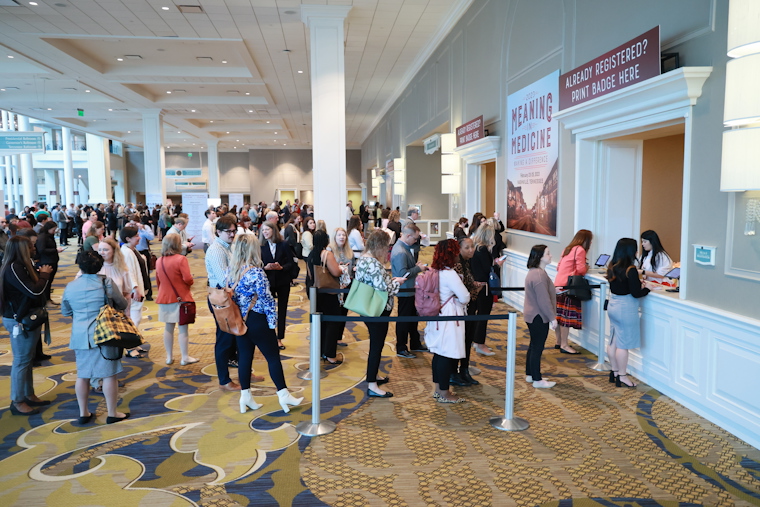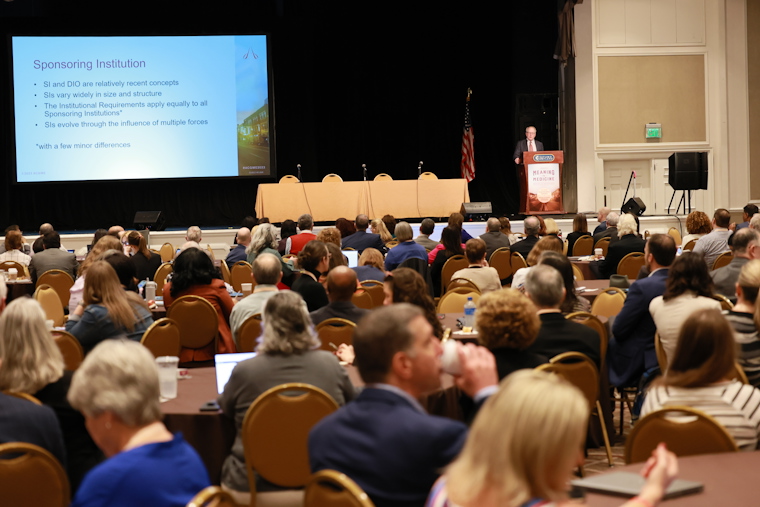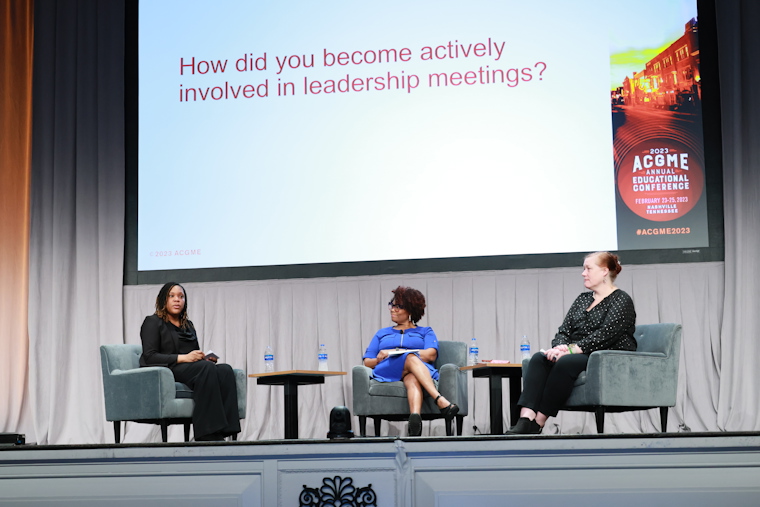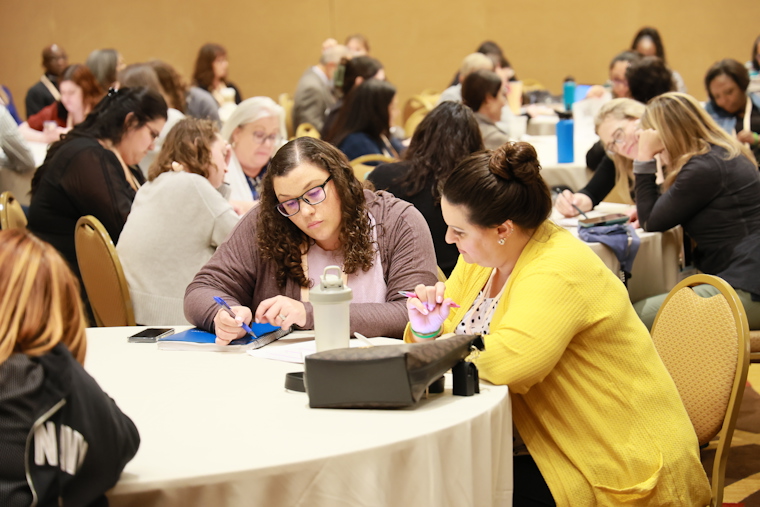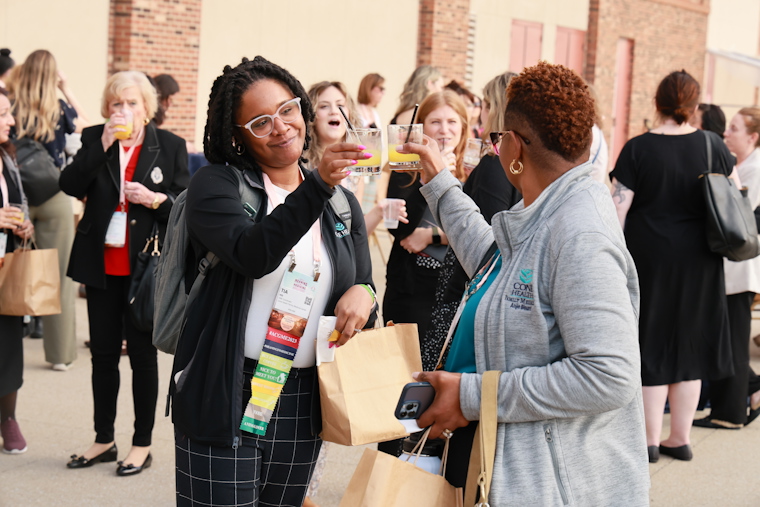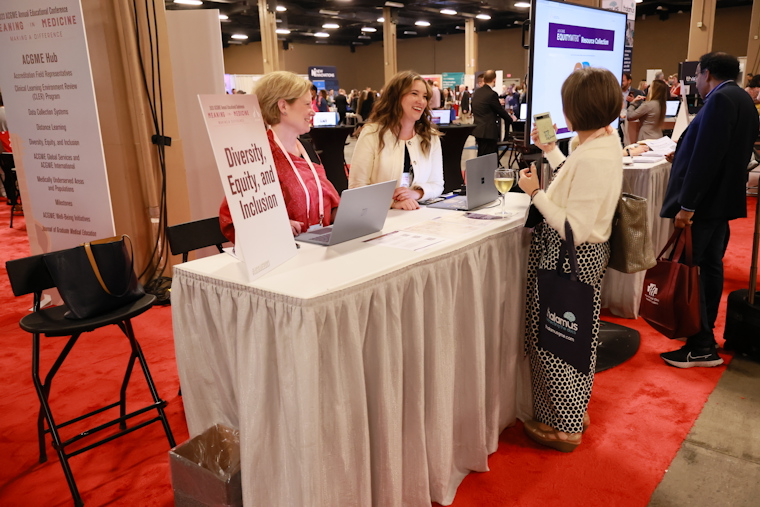Handshakes, elbow bumps, hugs, greetings, and meetings marked the opening day of the 2023 ACGME Annual Educational Conference as more than 4,000 members of the graduate medical education (GME) community gathered in Nashville, Tennessee to network, learn, and share.
Thursday featured multiple Full-Day Courses, tailored to specific roles and functions in GME, a networking event for coordinators, a reception for residents and fellows, the annual Marvin R. Dunn Welcoming Poster Reception and Exhibitor Kick-Off, and a celebratory dinner for awardees.
Insights into the Accreditation Process: A Course for Program Directors
Both new and more experienced GME program leaders filled the room for this annual Full-Day Course designed to break down and simplify accreditation review.
To help program directors better understand the ACGME accreditation process, the day began with a mock Review Committee meeting, in which the attendees were the committee members. Presented with a test case, each table functioned as an individual committee, reviewing the evidence provided and deliberating on the accreditation decision they would issue. Following the group work, a panel of Review Committee members demonstrated their process by holding a review of the test case and then explained the rationale for the decision they made.
ACGME Chief Accreditation Officer Lynne M. Kirk, MD, MACP told audience members the exercise meant they got a "head start" in understanding the work of the Review Committees, an advantage that will aid them in their role as program directors, as well as future volunteer Review Committee members.
The course also provided helpful information about Program Requirement compliance, the role of the Milestones in accreditation, and more.
Medical Director Navid Rashid, MD from the Northern Virginia Mental Health Institute said the course was informative and provided a lot of information that would help their process of instituting a new program.
Osteopathic Recognition Full-Day Course
The agenda for this course, a partnership between the ACGME and the Assembly of Osteopathic Graduate Medical Educators (AOGME), featured detailed information, resource sharing, and support for programs with Osteopathic Recognition and programs that may consider applying for Osteopathic Recognition. The first session of the day set the scene with a strong collaborative message: “You Can DO It.” That theme resonated throughout the day. Presenters and attendees shared tools, insights, and innovations, reassuring newer programs and program personnel from the perspectives of those with more established programs with ACGME Osteopathic Recognition.
Dimitri Tito, DO, a resident at Western Michigan University Homer Stryker MD School of Medicine, presented on the positive impact of Osteopathic Recognition on both osteopathic- and allopathic-educated residents and programs, and noting there is a dearth of research on the topic. A common thread woven throughout the course was the bridge between MD and DO physicians, and the expanded exposure to osteopathic philosophy, helping to build greater understanding and mutual respect among colleagues.
Full-Day Course for Designated Institutional Officials (DIOs)
The Full-Day Course for this key role in the ACGME-accredited Sponsoring Institution provided insights on effectively overseeing GME programs, tips for optimizing Graduate Medical Education Committee (GMEC) meetings, and details on how the Institutional Review Committee (IRC) interprets and applies the Institutional Requirements.
“As a DIO, I understand every citation is like a stake in the heart,” said IRC Chair Steven Rose, MD. But he stressed not all citations are created equal, and the IRC is most concerned about those from institutional culture, such as those that ensure resident and fellow physical and psychological safety. Dr. Rose encouraged attendees to use resources on the ACGME website, which he noted are there to provide critical context.
The course also featured a session on change management. Speaker Eric Pong, MD, DIO of Virginia Mason Franciscan Health, discussed levels of change and steps required for success. He had attendees write down an instance of change they managed and map it to the levels of change that were presented. The speed of change in academic medicine doesn’t seem to be slowing down, Dr. Pong said, so DIOs should make a point to keep learning. “Avail yourself of anything and everything to develop yourself as a DIO and organizational leader,” he said.
Advancing Outcomes-Based Research in Medical Education
ACGME President and Chief Executive Officer Thomas J. Nasca, MD, MACP introduced the first-ever Full-Day Course dedicated to outcomes-based research. With discussion of the ACGME’s improvement initiatives and acknowledgement of the firewall between improvement efforts (such as the Clinical Learning Environment Review (CLER) Program) and accreditation work, Chief Research, Milestone Development, and Evaluation Officer Eric Holmboe, MD, MACP, FRCP addressed the need to look at educational and health care outcomes as one and the same.
Panel discussions and group activities provided insights into recent methodologic approaches and challenges, sharing research findings, and discussing implications of outcomes research for improving medical education and advancing competency-based medical education.
Outcomes research was discussed from a variety of perspectives, including professionalism, ethics, and bias; workforce and equity; clinical care outcomes; and clinical care, both procedural and non-procedural.
Coordinator Forum
A record number of attendees turned out for the annual Coordinator Forum: Navigating with Confidence. More than 1,700 institutional and program coordinators were in the audience to hear DeLonda Dowling, Karen McCausland, MBA, C-TAGME, and LaToya Wright, BBA, C-TAGME present “Advocating for Yourself as an Administrative Leader: The Good, the Bad, and the Ugly.” After introductions from ACGME Chief Education Officer and Chief of Staff Timothy P. Brigham, MDiv, MS, PhD and Director, Educational Activities Lauren Wojnarowski, MA, the panel shared personal experiences of navigating their journeys to becoming administrative leaders. They included stories of allies they met along the way and the importance of effective negotiation, creativity, self-promotion, and setting professional barriers.
The opening session set the tone for the day, as attendees spent a majority of the Full-Day Course in breakout rooms discussing topics including professional development, GME funding, pillars of a supportive culture, emotional intelligence, managing up, hybrid work and well-being, and much more.
An informative and motivational session, “It’s Your Career – Take Charge of It” with Leanna Bell, MHRM and Bethany Millar, BS, C-TAGME, discussed adapting to evolving workforce trends, how to increase fulfillment at work, and how to use data-driven analysis to illustrate the purpose and value of their positions.
The first ever Coordinator Networking Reception event, at which attendees were encouraged to find like-minded individuals, personally and professionally, and connect to win prizes, closed out the day.
Rounding Out the Day in Celebration
Thursday concluded with a large reception. Attendees wandered through the Exhibit Hall with displays and demonstrations from 69 vendors and organizations and perused more than 70 posters displaying research from across GME. At a special Awards Dinner event, more than 30 individuals and institutions were honored for their innovation and commitment to GME.
Looking Ahead
This morning starts with the Welcome and President’s Plenary, followed by an agenda packed with educational sessions, networking opportunities, and engagement activities. The day will close with various receptions and more gathering and reconnecting. Come back to this Blog for the recap!

